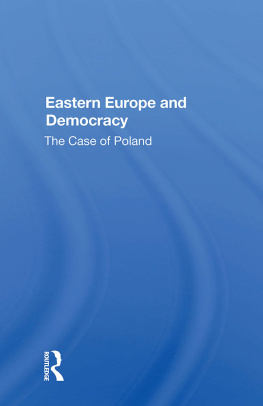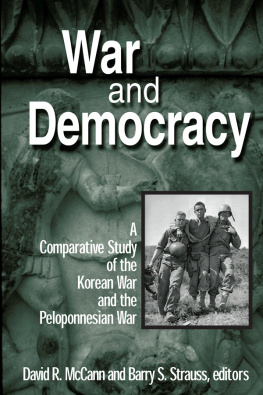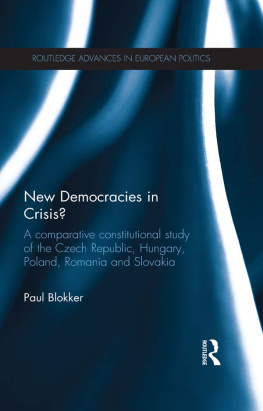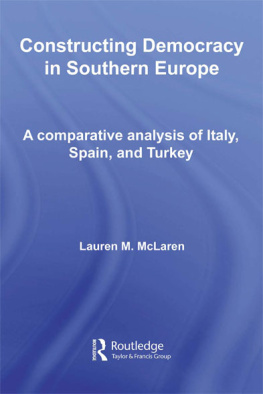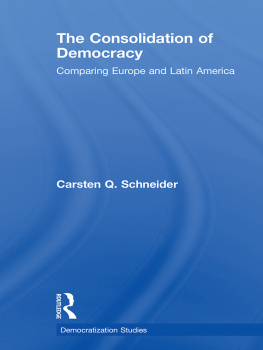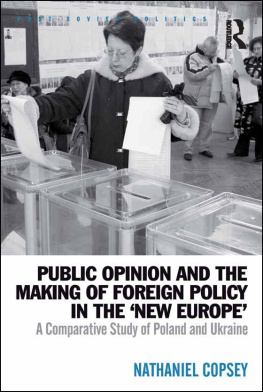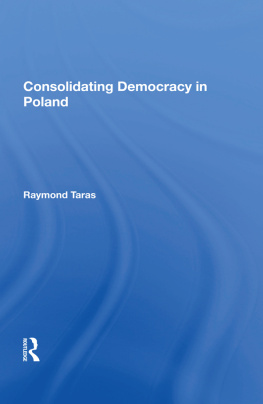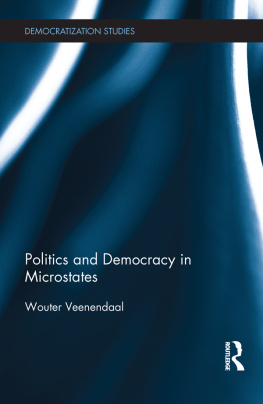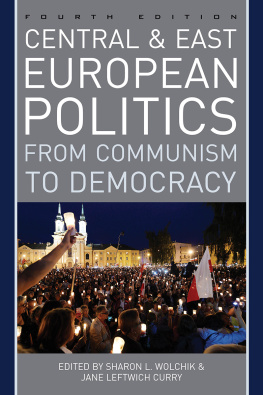First published 1990 by Westview Press
Published 2018 by Routledge
52 Vanderbilt Avenue, New York, NY 10017
2 Park Square, Milton Park, Abingdon, Oxon OX14 4RN
Routledge is an imprint of the Taylor & Francis Group, an informa business
Copyright 1990 Taylor & Francis
All rights reserved. No part of this book may be reprinted or reproduced or utilised in any form or by any electronic, mechanical, or other means, now known or hereafter invented, including photocopying and recording, or in any information storage or retrieval system, without permission in writing from the publishers.
Notice:
Product or corporate names may be trademarks or registered trademarks, and are used only for identification and explanation without intent to infringe.
Lamentowicz, Wojciech.
Eastern Europe and democracy : the case of Poland / by Wojciech Lamentowicz, Krzysztof Ostrowski, and Maciej Perczynski ; Peter Volten, ed.
p. cm. (Special report / Institute for East-West Security Studies)
ISBN 0-913449-17-2: $11.95. ISBN 0-8133-8088-X (Westview)
1. PolandPolitics and government1989- I. Ostrowski, Krzysztof. II. Perczynski, Maciej. III. Volten, Peter M. E. IV. Title. V. Series: Special report (Institute for East-West Security Studies)
DK4449.L36 1990
943.8dc20
90-4900
CIP
ISBN 13: 978-0-367-01601-2 (hbk)
The events of 1989 in Eastern and Central Europe have shaken the foundations of the postwar bipolar security system. The quest for democracydemonstrated by such disparate events as the election of a Solidarity prime minister in Poland, East Germans "voting with their feet" and leaving in droves for West Germany, and the violent overthrow of the Ceausescu dictatorship in Romaniahave resulted in a new Europe, one in which "East" and "West" will have increasingly less meaning. The move toward democracy will affect every aspect of life in Eastern and Central Europe and the Soviet Unionpolitical, social, economicand impact upon their neighbors in Western Europe. The Institute for East-West Security Studies brought together specialists from Eastern, Central and Western Europe, the United States and the Soviet Union on March 1-3, 1990, in Warsaw, Poland, to discuss these critical issues. Representatives from the countries currently engaged in the process of democratization included former opposition activists, members of the new, non-communist-dominated governments, as well as former party members. The group, chaired by Max van der Stoel, Member of the State Council of the Netherlands, is a subcommittee of the IEWSS Working Group on "East-West Cooperation: Coping with Change in a Multipolar World."
The conference participants agreed that there are three distinct stages in the process of democratization: 1) the end of the authoritarian regime; 2) the creation of infrastructure for a democratic system; and 3) the consolidation of the democratic system. There was debate, however, over whether democracy is only a system of government or a set of values and guidelines for achieving better solutions to problems such as government responsiveness and economic efficiencyin short, a way of life.
Participants cited a number of causes for the collapse of authoritarian regimes, including: 1) problems in establishing their legitimacy; 2) problems of economic development; 3) the strength of religion (in Eastern Europe, particularly Catholicism); 4) the role of external forces (e.g., human rights pressure from the United States and Soviet foreign policy "new thinking"); and 5) the "snowball" effect: when one country democratizes, others are encouraged to do the same.
The group rejected the idea that it is possible to find one simple solution or model that can resolve all political, economic and social problems arising in Eastern and Central Europe after the collapse of authoritarianism. Democratization is not an easy process. Too often countries assume that they can carry out the transformation despite the fact that their economic, social and institutional circumstances may not yet be suited for adapting to the demands of democracy. Although the creation of formal political institutions is not such a difficult task in itself, making them functional, transforming a centrally planned economic system into a market economy and transforming values and ways of thinking are long and complicated processes. The general view was that it would take at least a generation, if not longer, to effect these changes in Eastern and Central Europe.
Many of the participants, including those from Eastern Europe itself, maintained that East Europeans lack a basic understanding of how the political institutions of democracy actually work; this creates the possibility that democracy could be discredited because of the lack of sufficient understanding-both popular and institutionalof its implications. Conditions are likely to get worse before they get better. Participants from Poland, Hungary and Bulgaria expressed the fear that there might be a period of widespread disintegration beyond the collapse of the central authority, that a more general deterioration of a variety of social links in all areas of life could develop. This could create the danger of chaos or a return to some sort of hard-line, authoritarian course whether of the left or right.
The conference participants identified several mutually reinforcing political characteristics and fundamental features of a democratic society that could serve as guideposts for the countries of Eastern and Central Europe and the Soviet Union as they undertake the transformation of their systems. They agreed that basic political rights should include freedom of expression, which should be guaranteed to individuals as well as the mediano one should be persecuted because of his or her beliefs; free elections, in which political representatives should be elected by secret ballot in free, multiparty elections; and freedom to travel and emigrate since, in a democratic society, there should be no restrictions on travel abroad and the emigration process should not be unduly difficult.
At a more fundamental level of society, the participants agreed that the rule of law must form the core of democracy. The government should be limited by a system of checks and balances that includes a strong and unbiased judiciary. In this way the government will be responsible to the people it governs.Furthermore, a truly democratic political system cannot exist without a highly developed civil society, composed of self-constituted groups, organizations and associations, both formal and informal, that have been created and exist outside the government, to check the power of the state. In turn, the rule of law and the existence of a well developed civil society foster popular trust in institutions. In a democratic society, the government is seen as legitimate by the people; the development of popular trust in political institutions is a prerequisite for such legitimacy.
According to a Czechoslovakian participant, functional democracy requires both a corrective mechanism and a stabilizing mechanism. The corrective mechanism must address the problems economic as well as politicalcreated by many years of authoritarianism and work to change them. The stabilizing mechanism should secure these changes and anchor them firmly in society. A Polish participant maintained that a successful democracy is based on two pillars. First, people should have some political power. Second, some minimum property rights should be granted to the people to allow a certain degree of economic independence. Particularly because of the right to private property, the middle class traditionally is the strongest supporter of democracy. The general lack or very small size of the bourgeoisie in Eastern and Central Europe and the Soviet Union hinders the process of democratization in these countries. Strengtheningor, in some cases, creatinga middle class should be one of the central aims of the processes of democratization and economic reform. While some conference participants questioned whether a bourgeoisie can be created by design, it was agreed that the population needed to buy into the system to gain a vested personal interest through their vote, ownership of property and exercise of democratic rights.


